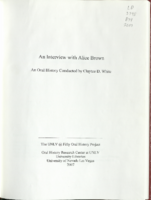Search the Special Collections and Archives Portal
Search Results
Conger, William "Bill": video interview and transcript, 2002 to 2005
Level of Description
Archival Collection
Pagination
- Previous page ‹‹
- Page 2
Archival Component

Transcript of interview with Alice Brown by Claytee D. White, October 19, 2005
Date
Archival Collection
Description
Text

Transcript of an interview with Clinton Wright by Claytee D. White, October 13, 2005
Date
Archival Collection
Description
Clinton Wright worked as a photographer for the Las Vegas Voice for fifteen years. In his interview, he discusses living and working in Las Vegas, and raising his family.
Text
#05285: Football - Picture Day, 1984 June 18
Level of Description
Archival Collection
Pagination
- Previous page ‹‹
- Page 2
Archival Component
Audio/visual recordings of radio interviews on KNPR, 2005-2009
Level of Description
Archival Collection
Pagination
- Previous page ‹‹
- Page 2
Archival Component

Transcript of interview with Flo Mlynarczyk by Claytee White, July 7, 2005
Date
Archival Collection
Description
Flo Mlynarczyk began life in Fort Morgan, Colorado. Her parents divorced and she moved with her mother first to Loveland and eventually to Los Angeles. Her mother started the first Red Cross in Bell Gardens, oversaw the building of their home, and raised money for various charities. Flo remembers when the Japanese were rounded up and interred during WWII. She was in grade school and recalls that one day they all just disappeared. Upon graduation from high school in 1943, Flo moved to Kodiak, Alaska, to live with friends. She recalls total blackouts on the streets of Kodiak due to the war, the Short Snorter Club, and her return to California after a bout of pneumonia. Back in Bell Gardens, Flo worked for a department store, married and divorced in 1945, gave birth to her son Michael in 1946, and ended up in Tonopah, Nevada, with a sister who ran a cafe there. After a second marriage ended, Flo moved to Las Vegas and began working at Phelps Pump and Equipment as a bookkeeper.
Text
Elmer Sowder oral history interview, 2005 July 29
Level of Description
Archival Collection
Pagination
- Previous page ‹‹
- Page 2
Archival Component
David B. Thomson oral history interview, 2005 April 12
Level of Description
Archival Collection
Pagination
- Previous page ‹‹
- Page 2
Archival Component
Philip Ulmer oral history interview, 2005 January 11
Level of Description
Archival Collection
Pagination
- Previous page ‹‹
- Page 2
Archival Component
Wayne Violette oral history interview, 2005 January 12
Level of Description
Archival Collection
Pagination
- Previous page ‹‹
- Page 2
Archival Component
